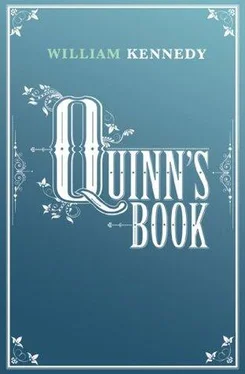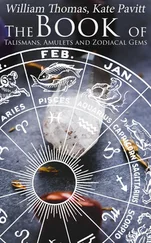“The cruel, cruel bastards,” he said. “They took his one and only tongue.”
THE Albany Chronicle , as we had known it, failed of business one month after Dirck’s return to the human race. Four attempts to set the premises ablaze were foiled, but nighttime vandals finally overpowered our sentinels and destroyed Will’s press with aggravated sledgings. Within one week Will was printing at the shop that published The Paddle , a penny-awful sheet of scandal and mayhem from around the globe (the terrible fate of eunuchs in a Persian harem, the Mouth Murders by the mad dentist of Baltimore); but by then The Society’s many members had withdrawn their paid notices. Even advertisers loyal to Will, finding themselves threatened, withdrew also. Will pressed on with his waning capital, being but a week from closing when Hillegond bought out The Paddle and installed Will as editor. Will merged the publications, fusing the inherited mayhem with his own politics, and naming the new publication the Chronicle-Paddle , a grotesque and short-lived fusion. Will kept it long enough to ensure an orderly transition of readers, but then diminished the word Paddle to minuscularity and, after a year, banished it altogether.
Dirck recovered his health but found his tongueless words no more than idiot grunts; and so he went silent. Because he believed I had saved his life (actually, he might have survived alone, even in the filthy hay — unlike Maud, who required my intercession to remain among the quick), Dirck made me his intermediary. He would scrawl swift messages with his everpointed pencil, then thrust the scrawls at me to read aloud. He wrote of his ordeals in fragments that belied their own truth: “Held me in wonderful chicken coop. . The gentle Jeremiah Plum took orders from kindly bass-voiced stranger who visited me wearing black veil on his face. . Unfortunate man with partial ear guarded me with kindness. . I nevertheless felt selfish need to loosen ropes to escape and return to work at Chronicle . . Hid in barn, too weak to run. . Surely against his wishes, Aaron Plum smashed my face with plank and severed my tongue while holding it with pincers. . Man with veil cautioned Aaron not to kill me while severing tongue. . My father, wondrous man, saved my life.”
This euphoric response to Plum captivity and torture was peculiar indeed. Will viewed Dirck’s behavior as akin to that of the Christian martyrs who found in all horrors the glorification of that which was greater than themselves: vileness is beauty, punishment is reward, death is life. I saw this equation then, and I see it still, as crackbrained. Dirck’s remark about his father was the most peculiar of all, for Petrus Staats had died in 1835, fifteen years before these events took place.
Petrus entered my life indirectly upon the arrival at the mansion of Lyman Fitzgibbon, the merchant-scientist. He was the godfather of Dirck, the former business partner of Petrus, and an inventor of infinite and ingenious improvements on metal-working machines. He was also the father of Gordon Hamilton Fitzgibbon, who would become one of the most confounding figures in my life, an ambivalent man of prodigious energy and erudition, also a writer of sorts, who on this night was away at law school in Yale College.
I was in the foyer when Lyman rapped with the knocker. I opened the door to see this tall and muscular man with a full white beard, full head of white hair, and beside him his handsome wife, Emily, in a long gown of black satin.
“Who are we here?” the man inquired of me.
“We are Daniel Quinn, sir, and we live here through the kindness of Mrs. Staats. May I announce you to her?”
“A quick tongue on you, boy. I like that. Tell Hillegond Lyman has come back.”
He had returned from Washington, where in recent years he had been serving in an English diplomatic post. London-born, Oxford-educated, Lyman Fitzgibbon had come to America at the age of twenty-six, met and married the wealthy Emily Taylor (her wealth came from shipping), and swiftly joined his wife’s wealth with Petrus in the nailworks that would become an ironworks and then the largest stove-making foundry in the city. Lyman became an investor in banks, insurance, railroads, and assorted commerce as far west as Buffalo and, not least, a land speculator of grand proportion, the speculation generally in service of a commercial enterprise higher than itself. He would, by the mature decades of his life, be Albany’s richest man, his vaunted power, when coupled to nothing more than resolute silence, capable of turning men of perfectly sound ego into cringing and snivelous whelps.
I led the Fitzgibbons to the east parlor to await Hillegond’s appearance. Lyman stopped before Dirck’s portrait on the east wall and spoke toward it.
“How is the boy?”
“He’s recovering, but cannot speak,” I said.
“You were his rescuer,” he said, turning to me.
“I helped him in his trouble,” I said.
“You’re quick, and you’re modest. You will go far in this world, young man.”
“I thank you, sir.”
“Don’t thank me. Thank whoever it was taught you to be quick and modest. You’ll shed that modesty in time.”
I nodded, perceiving in myself not modesty but inadequacy, and wondering with what one replaced modesty, once shed. I found Dirck and told him of Lyman’s arrival, and went with him to the east parlor. Lyman embraced Dirck, saying, “You shouldn’t have written that book, son. You know it was wrong.”
Dirck stared at Lyman, neither contradicting nor agreeing. The knocker sounded again, and Capricorn this time admitted Will Canaday and his ladylove, the handsome widow woman Felicity Baker, a teacher of needlework and deportment at the Albany Female Academy. Our spate of visitors on this evening had been summoned to a musical soiree through which Hillegond hoped to buoy the warped and muted spirit of Dirck. Long a benefactress of The Museum, Hillegond had asked Dorf Miller to choose among his current talent and provide us with an hour’s entertainment. Dorf arrived with pianoforte, violin, tambourine, and banjo virtuosi; also with Joseph K. Moran and a young woman I’d not seen before. Dorf introduced her as Heidi Grahn, a songstress late of Sweden, and at the first sight of her, Dirck’s dark mood faded. He separated himself from his godfather and entered into a fury of note writing: “Be sure she stays after performance,” said the first note he thrust at me. “Tell her I am taken with her voice” (she had not yet uttered a note). . “Is she married, betrothed?. . Ask whether she enjoys poetry. .”
I had no chance to do this, for by then our guests had filed into the music room, a polygonal extension from an eastern wall of the mansion, a semicircular room with mullioned windows and an intricately carved oak ceiling that gave one the sense of being in the apse of a cathedral. The guests besat themselves on plush mahogany benches beneath a pair of murals painted by Ruggiero and depicting the contemporary Staatses: Petrus and Hillegond, whose peripatetic excursions in Europe (in company with the Fitzgibbons) had been the source of many of the works of art, and not-art, that abounded in the mansion. In his portrait Petrus played a great gilded harp (which remained in the far corner of the salon, as Petrus did not), and the image of Hillegond ebulliently fingered the pianoforte, from which she was, in life, incapable of extracting even minimal musical coherence.
Joseph K. Moran saw me and waved from the front of the room. Our plans to do the tenor-to-the-rescue act for Dorf had collapsed when I became linked to Dirck in his infirm time, and well enough so, for Joseph needed no collaborators. His two songs on the opening night of Tambo and Paddy had engendered two encores, so Dorf gave him four songs the second night, engendering four encores; and even that left the audience unsated. The talk abroad in the city was that Joseph Moran would be a performer of great magnitude ere long.
Читать дальше












